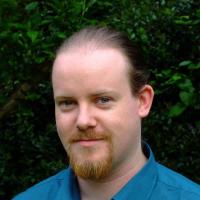訊息: 9
語言: English
Rohan (顯示個人資料) 2008年8月19日上午10:02:08
The verb 'naski' means 'to give birth'. And 'naskigxi' means 'to be born'.
If these meanings are accepted, then one ought to be able to distinguish between 'denaske' and 'denaskigxe' in the following manner:
denaske = since giving birth
denaskigxe = since being born
Then, 'denaska parolanto' ought to mean 'a speaker since giving birth', while 'native speaker' ought to be 'denaskigxa parolanto', 'a speaker since being born'.
What say you?
Miland (顯示個人資料) 2008年8月19日下午12:47:12
But if you want to be more precise still, no-one is born speaking Esperanto, so you might say kreskanta parolanto.
Even this is not precise enough, since biological growth and human culture are two different things, so we might want to use deinfaneca parolanto. An alternative might be unualingva parolanto.
Then again, someone might deliberately abandon their first language and use Esperanto till it had replaced their first language which they virtually forgot through disuse. I'll leave that one to you..
eb.eric (顯示個人資料) 2008年8月19日下午2:17:34
Miland:Good argument, but denaska has become widely used, and we could also interpret it as referring to the event of birth (from the mother's point of view).On the other hand, kreski wouldn't need -iĝi as it is already intransitive.
But if you want to be more precise still, no-one is born speaking Esperanto, so you might say kreskiĝanta parolanto.
Even this is not precise enough, since biological growth and human culture are two different things, so we might want to use deinfaneca parolanto. An alternative might be unualingva parolanto.
Then again, someone might deliberately abandon their first language and use Esperanto till it had replaced their first language which they virtually forgot through disuse. I'll leave that one to you..
Maybe dumkreska lingvo aŭ eĉ principjuneca lingvo (la lingvo kiu, dum la juneco kaj kreskado, estis uzata principe).
It is a hard thing to define though. I'll give it a shot.
Maybe we're talking about a language that was learned to proficiency, and this proficiency wasn't attained after a significant time after already being proficient in another language. ie. if you have one, it is the first language you became proficient in. If you have two, after you were born, you learned two languages and became proficient in them both at around the same time. "Proficient" needs defining, but we'll assume it means what you expect it should mean.
So how can I condense that into an Esperanto word... I can't.
I keep thinking "de-flowering" haha in the sense that you acquire (a) language(s) for the first time. Now I'm hearing Madonna in my head. Oh man... too much coffee.
Miland (顯示個人資料) 2008年8月19日下午3:33:17
davidwelsh (顯示個人資料) 2008年8月19日下午9:29:03
Miland (顯示個人資料) 2008年8月19日下午9:43:52
davidwelsh:"Patrina lingvo" has rather a nice ring to it don't you think?I agree about the niceness, but in fact my mother's first language is not the one I think in. For that reason I prefer the term 'first language'.
Tomhadland (顯示個人資料) 2008年8月20日下午1:30:48
Miland:I'm sure I've heard 'gepatra lingvo' somewhere. Apologies if someone has already said this!davidwelsh:"Patrina lingvo" has rather a nice ring to it don't you think?I agree about the niceness, but, in fact my mother's first language is not the one I think in. For that reason I prefer the term 'first language'.
guyjohnston (顯示個人資料) 2008年8月22日下午8:17:30
Timtim (顯示個人資料) 2008年8月30日上午9:13:05
It's accepted as what it is, but logic seems to suggest that X is a speaker since *sia* birth, which would be naskig'o. X is a denaskig'a parolanto.
I happened to mention this to a denaskulo (aren't we all?) and he agreed perfectly that this was better ... then we carried on saying denaska ever since because it's established and understood and has since become more natural anyway. (Besides, if you really wanted to be literal, then you'd have to create a new expression anyway, since even the most capable of us don't speak from the moment of our birth.)




